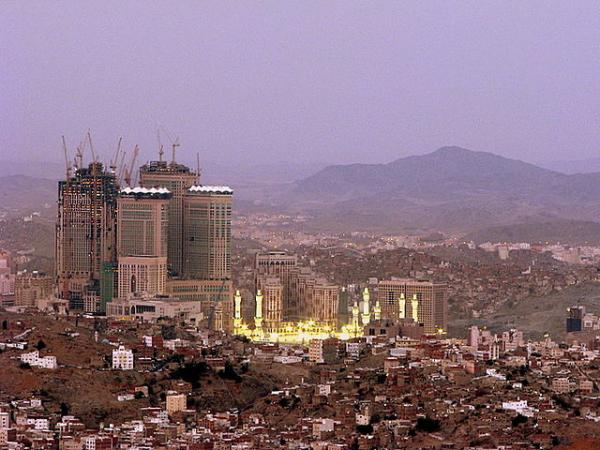
For Muslims, Makkah, where the Ka’ba is located, is the epicenter of their faith and Madinah, home of the Prophet’s mosque, their sanctuary for spiritual bliss. These two cities happen to be in Saudi Arabia, which is once again in the news for the most chilling of reasons, presenting Muslims with a difficult decision to make.
Last week, we learned that the country likely killed one of its own citizens, in cold blood, inside its own consulate, in a foreign land. While we do not have incontrovertible proof, we know enough to be worried and concerned. How the great powers on the global stage respond is beyond our control. But what we choose to do as ordinary Muslims is not.
It is time to boycott Saudi Arabia. Stop visiting the country for umrah (optional pilgrimage) and hajj (obligatory pilgrimage). Such a call is indeed draconian and may even sound like contravening fundamental religious obligations. But the Quranic ideal of justice commands Muslims to take a stand, even at great discomfort to self-interest.
O ye who believe! stand out firmly for justice, as witnesses to Allah, even as against yourselves, or your parents, or your kin, and whether it be (against) rich or poor: for Allah can best protect both. Follow not the lusts (of your hearts), lest ye swerve, and if ye distort (justice) or decline to do justice, verily Allah is well-acquainted with all that ye do. (Quran 4:135).
How can we continue to provide tacit support to the House of Saud as the custodians of the two holy mosques when they cannot be trusted as custodians of human life itself?
I am not advocating indiscriminate Boycott, Divestment and Sanctions (BDS), which can hurt reformist voices inside Saudi Arabia, by making an already brutal regime even more hardline. But a significant reduction in pilgrims will send a powerful message to the House of Saud, who derive prestige from their self-anointed status as the guardians of Islam.
Saudi Arabia officially estimates that it earns nearly $8.5 billion annually from hajj alone, according to figures from 2014. About 70 percent of that expenditure comes from overseas visitors. Nearly nine times as many people perform umrah (19 million) than hajj (2.4 million). By 2022 experts estimate Saudi Arabia’s revenues from hajj and umrah will exceed $150 billion. The gruesome killing of journalist Jamal Khashoggi ought to be the impetus that puts an economic dent on the Kingdom’s facade.
Saudi Arabia bears culpability in destabilizing a region, imprisoning dissidents, mercilessly extinguishing the lives of innocents and continuing to export an intolerant and perverted version of Islam. But its Yemen entanglement is significantly more insidious. While the crisis is well documented, it is not well publicized and certainly not adequately addressed. The European Union has described Yemen as the worst humanitarian crisis in the world today. In total, nearly 50,000 people have been killed, according to unofficial estimates from ACLED, a group that studies global conflicts. The United Nation estimates that 22.2 million people in Yemen need assistance, 8.4 million people suffer from severe food insecurity, and a further 10 million could fall under the same category by the end of the year, if action is not urgently taken. Millions are on the brink of starvation.
Make no mistake that this is a man-made crisis created by the very people claiming to be custodians of holiness and funded in part by the U.S.
The likely murder of Khashoggi is justifiably drawing a lot of attention. But, for the past two years the plight of Yemenis has, for the most part, escaped our collective consciousness. This gives credence to Stalin’s quote, “The death of one man is a tragedy, the death of millions is a statistic.” But in this instance, we have a chance to take the tragedy of one death to cast a light on the tragedies faced by millions.
While official American actions, in the form of cancellation of arms sale and imposition of the Magnitsky Act sanctions against the Saudi elite, may have to wait a change of regime in Washington (Trump seems to be looking the other way), Muslims need not wait to fulfill their personal fidelity to justice by taking a stand – silent no more.
Moral clarity requires that those championing BDS against Israel also advocate for a boycott of Saudi Arabia too. Under any objective standard, the behavior of the Saudi regime is comparable to Israel’s treatment of Palestinians in the other Holy Land.
When they were young, my children used to watch a video about a person who gave up the money he saved for hajj to feed his hungry neighbor. The story illustrated that the purpose of pilgrimage is not a mere physical journey to the heart of Islam, but more importantly a striving that is aimed at provoking a spiritual awakening. The goal is to link thoughts and actions to the will of the Divine by engendering compassion for humanity.
What good is our pilgrimage if the host regime uses our money and the legitimacy that our visit provides to not only engage in perpetrating the greatest humanitarian crisis of our time but also to commit cold blooded murder of journalists, for the ostensible purpose of squelching any dissent?












